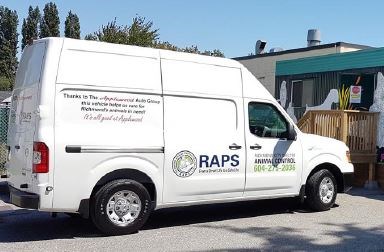A Richmond-based animal charity has appealed to the B.C. government for protection against strike action by his workers – by declaring its operations as an “essential service.”
The request from the Regional Animal Protection Society (RAPS) comes after the union that represents its workers, CUPE 718, called in a mediator in a bid to reach the group’s first ever collective agreement.
RAPS’ workers have yet to reach an agreement, despite forming a union about a year ago.
However, Dal Benning, CUPE Local 718 president, told the Richmond News that mediation is a “very common step in the collective bargaining process.”
And he added that the “bargaining unit has not taken any strike vote, and we are optimistic that with the assistance of the mediator, we will reach a fair deal.”
RAPS last week released a statement suggesting that animal rescue organizations in Canada need essential services designation under labour legislation.
And it has written to B.C.’s Minister of Labour, Harry Bains, to ask for a change to the B.C. Labour Code.
They said that the “absence of such a designation puts the lives of animals at risk, and presents legal liabilities for the organizations and their volunteers.”
And, while essential service legislation “protects humans, it does not include similar protections for the welfare of animals,” according to Rebeka Breder, an animal rights lawyer and RAPS board member.
“If a unionized animal care organization has hundreds of animals under its care needing basic daily necessities and health care and the union initiates a strike, who will care for the animals?
“It is prohibited by law to replace the workers with new workers or volunteers. The animal organization must abide by either the labour code or animal cruelty legislation. It is a catch-22.”
RAPS’ CEO, Eyal Lichtmann, added that there is “no guarantee that an application to the Labour Relations Board for essential services designation prior to a strike would be granted, which could leave the directors of an animal charity open to animal cruelty charges, upwards of $75,000 in fines and a possible jail term of five years for each director.
“That is an unreasonable risk for volunteer board members. We have a fiduciary duty to safeguard the animals and ensure our board of directors are legally protected based on the labour and animal cruelty laws as they are currently written.”
In the event of a strike, Lichtmann said RAPS’ volunteers and employees “would face the choice of abrogating our responsibility to the animals or risking legal or quasi-judicial sanction for ensuring these animals are cared for and receive the necessities of life.”

.jpg;w=120;h=80;mode=crop)


